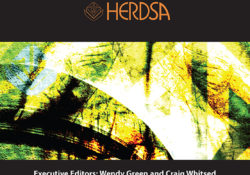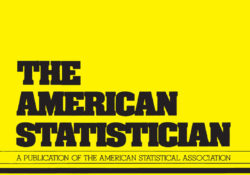eric.ed.gov har udgivet: In the assessment literature, a general recommendation has been to disaggregate scores and other data for students with limited English proficiency (LEP). This has rarely been done for most non-English language background (NELB) students in the United States, with the partial exception of Spanish speakers. Nationwide Spanish speakers make up the largest group of LEP/NELB students, but in Minnesota Southeast Asian students make up the largest single group of students with a language other than English spoken at home. While LEP/NELB students share some common characteristics, there are enough noteworthy differences to justify separate studies. This document reports on the achievement of LEP/NELB students from the largest seven language groups in Minnesota (Hmong, Spanish, Vietnamese, Lao, Cambodian, African languages, Russian) during the 1995-1996 school year when the… Continue Reading →
Like this:
Like Loading...

tandfonline.com har udgivet en rapport under søgningen “Teacher Education Mathematics”: ABSTRACT ABSTRACT One consequence of novice researchers studying methodology textbooks is confusion: philosophical terminology is complicated and sometimes poorly defined. Another consequence is that inexperienced researchers divide themselves into epistemological cliques, which can inhibit inter-disciplinary discussions. This is a particular problem in subjects, such as Information Science, that bridge disciplines. This article attempts to address these issues by seeking ground common to researchers, regardless of their philosophical standpoint. It identifies several ‘tools of the mind’ which are expanded on and discussed. By becoming familiar with these tools, inexperienced researchers can gain practical insights that create context for philosophical terms they later encounter. ‘Tools of the mind’ discussed are captured in the following questions: What should I research? How do I… Continue Reading →
Like this:
Like Loading...
tandfonline.com har udgivet en rapport under søgningen “Teacher Education Mathematics”: Link til kilde
Like this:
Like Loading...
eric.ed.gov har udgivet: An attempt to meet the need for resource materials available for Adult Basic Education (ABE) personnel who work with Spanish-speaking adults is presented. The information presented was acquired by writing to commercial publishers throughout the country. Evaluations included were completed by identifying the usefulness of the curricular offerings for Spanish-speaking adults. Portions of the evaluations are designed for children and junior and senior high school students; some of these have proven useful to adults. Evaluative criteria used when the materials were assessed include: Title, Author, Publisher, Objectives, Criterion Measures, Instructional Components, Learner Prerequisite, Teacher Requirements, Reliability Effect, Cost and Time. (Author/CK) Link til kilde
Like this:
Like Loading...
eric.ed.gov har udgivet: This report describes the federally funded development and field testing of a math drill and practice computer software program for students with mild disabilities. Program features include: pre-assessment of pupil speed and accuracy, automatic placement of the pupil in appropriate problems for practice, automatic monitoring of pupil performance, and automatic adjustment of practice problems. Field testing was undertaken with junior and senior high students with learning disabilities as well as with grade 4-5 students without disabilities. A user’s manual included with the report offers a quick reference to basic operations of the program, detailed information regarding each program component and associated decision-making algorithms, and a glossary of terms. A teacher’s handbook provides guidelines for applying drill and practice in special and remedial math instruction, explains the theoretical… Continue Reading →
Like this:
Like Loading...
tandfonline.com har udgivet en rapport under søgningen “Teacher Education Mathematics”: ABSTRACT ABSTRACT In recent years, the concept of ‘worldview’ has resurfaced into the forefront of the international debate among scholars of religious education. With this study, we aim to contribute to the discussion with empirical material having a focus on worldview education in whole school education. The study deals with the Finnish teachers’ perceptions of worldview education in basic education. Teachers (N = 110) responded to a questionnaire concerning their experiences on how they feel about worldview education, how they deal with it and where does worldview education take place in schools according to teachers. The questionnaire included both quantitative and qualitative sections. According to the results, it appears that teachers consider worldview education to be relatively important in schools and… Continue Reading →
Like this:
Like Loading...
eric.ed.gov har udgivet: An attempt to meet the need for resource materials Spanish-speaking adults is presented. The information presented was acquired by writing to commercial publishers throughout the country. Evaluations included were completed by identifying the usefulness of the curricular offerings for Spanish-speaking adults. Portions of the evaluations are designed for children and junior high school students; some of these have proven useful to adults. Evaluative criteria used when the materials were assessed include: Title, Author, Publisher, Objectives, Criterion Measures, Instructional Components, Learner Prerequisite, Teacher Requirements, Reliability Effect, Cost, and Time. (Author/CK) Link til kilde
Like this:
Like Loading...
tandfonline.com har udgivet en rapport under søgningen “Teacher Education Mathematics”: ABSTRACT ABSTRACT In Finland, curriculum design is allegedly carried out through a deliberative process that involves various stakeholders, interest groups, experts and ordinary citizens. To facilitate participation in curriculum design, online crowdsourcing has been applied. The objective of this study is to explore to what extent the design process of the latest Finnish national curriculum for mathematics was open, democratic and deliberative. The theoretical framework of the study is the theory of democratic will-formation of the German philosopher Jürgen Habermas. The comments given on the early version of the core curriculum of mathematics were analysed using directed content analysis, in which the above theory was applied. In the empirical analysis, the comments on the core curriculum were divided into three… Continue Reading →
Like this:
Like Loading...
eric.ed.gov har udgivet: As part of an effort to improve basic math instruction at Vocational-Technical Institute (T-VI) in New Mexico, a survey was conducted asking teachers, tutors, and instructional technicians to assess the importance of and student performance on 35 basic math competencies. Survey responses were then related to two national standards of mathematical literacy: the vocational standards of the Secretary of Labor’s Commission on Achieving the Necessary Skills (SCANS) and the academic standards of the National Council of Teachers of Mathematics (NCTM). Study highlights included the following: (1) several skills seen as important by SCANS and NCTM were viewed as unimportant by teachers of math and math-related subjects, including “working together in groups to solve problems,””using calculators,””ability to estimate,””ability to use measuring tools and systems,” and “ability to use… Continue Reading →
Like this:
Like Loading...
eric.ed.gov har udgivet: Phase I of a study was conducted to identify the basic mathematics competencies needed for job success in office occupations (14 job clusters). It also sought to determine the differences between employees’ and employer/supervisors’ perceptions of the degree of importance of mathematics skills for office occupations. Following a review of literature, a preliminary list of business and office mathematics skills was submitted to an advisory committee of business teachers, field tested, and refined into a questionnaire that contained a list of 36 basic mathematics skills and 30 mathematics-related business skills. Survey forms were created and sent to 1,652 employees and 288 employer/supervisors at 58 businesses in Louisiana, with responses returned by 854 employees and 171 employer/supervisors. Tables were prepared showing ratings of mathematics skills by each of… Continue Reading →
Like this:
Like Loading...



